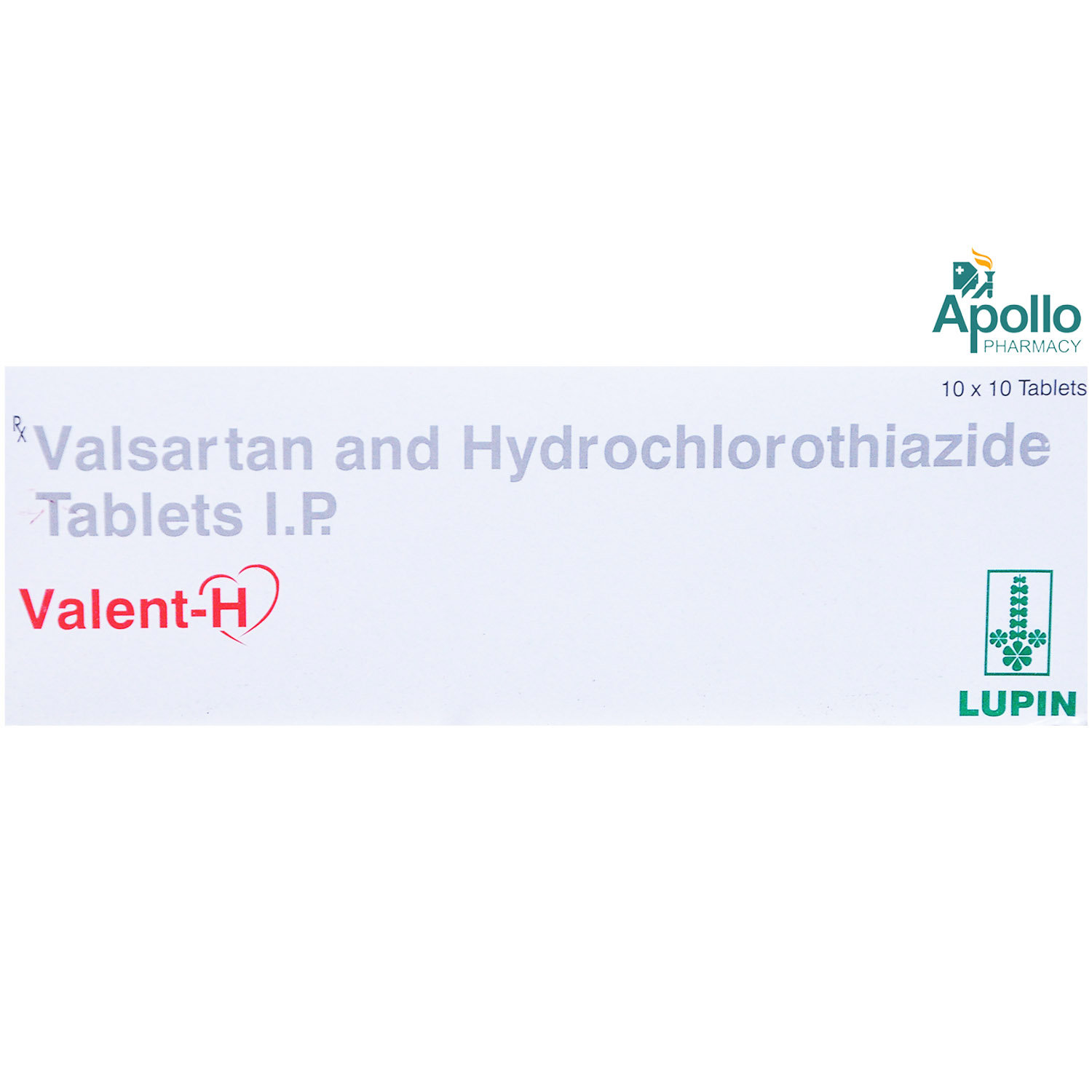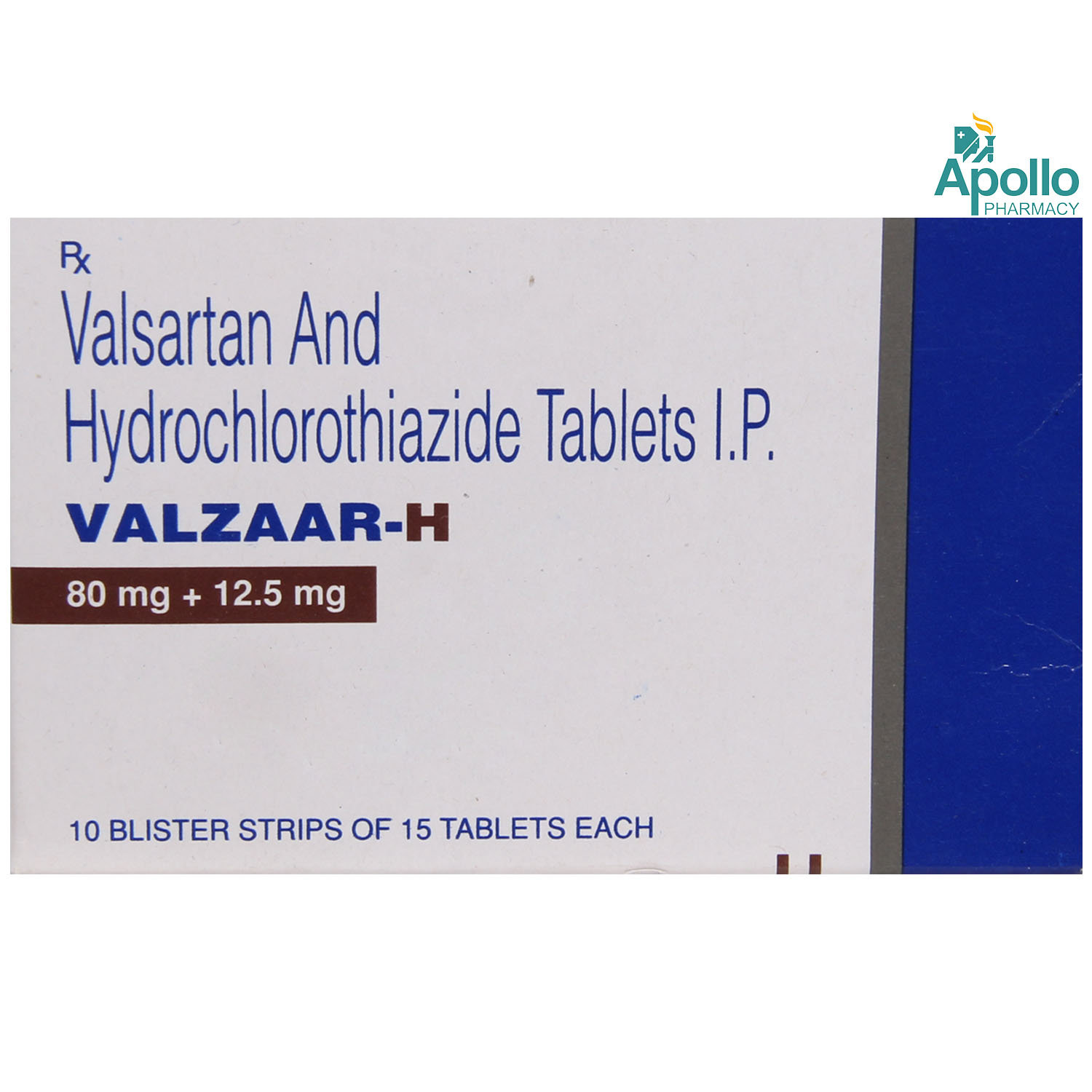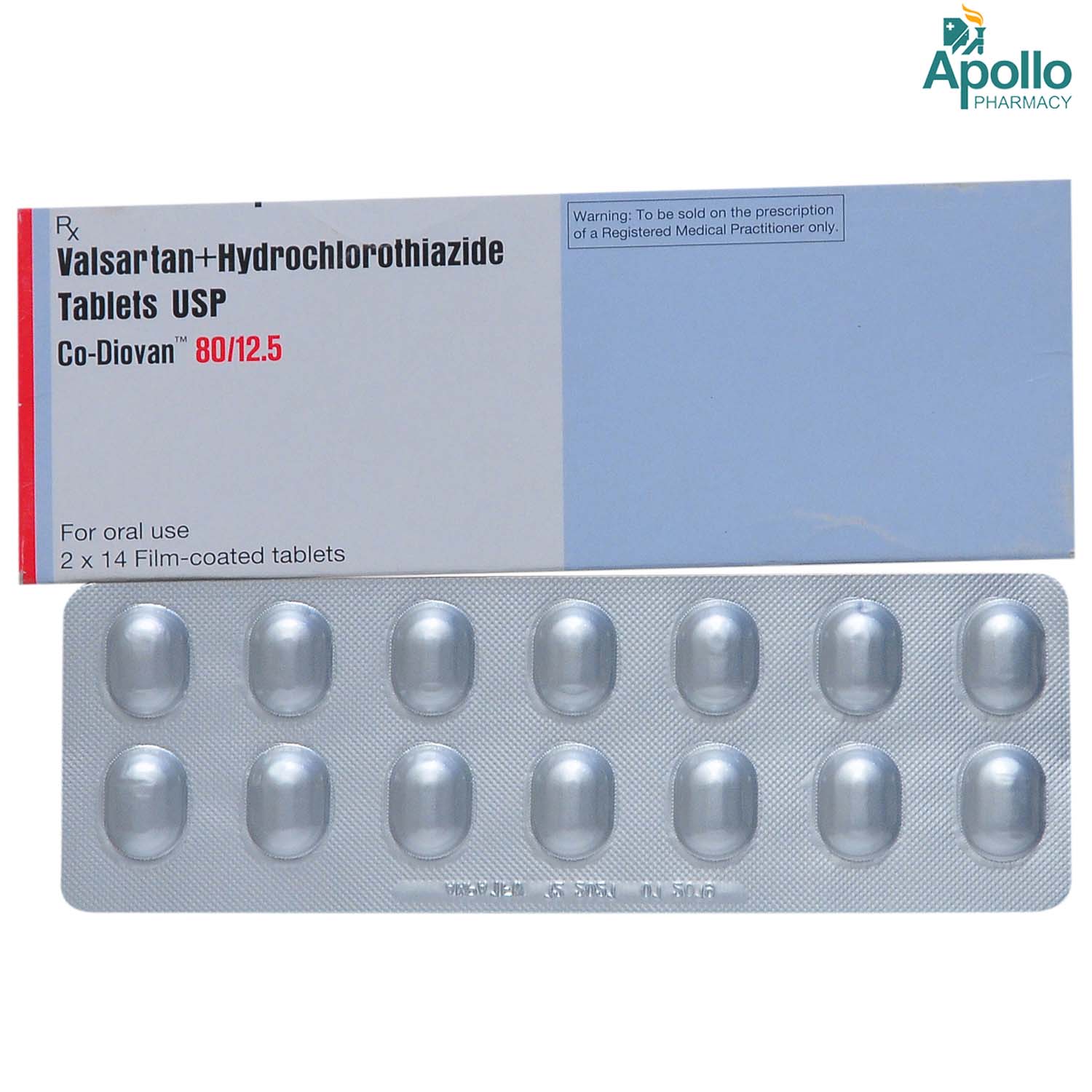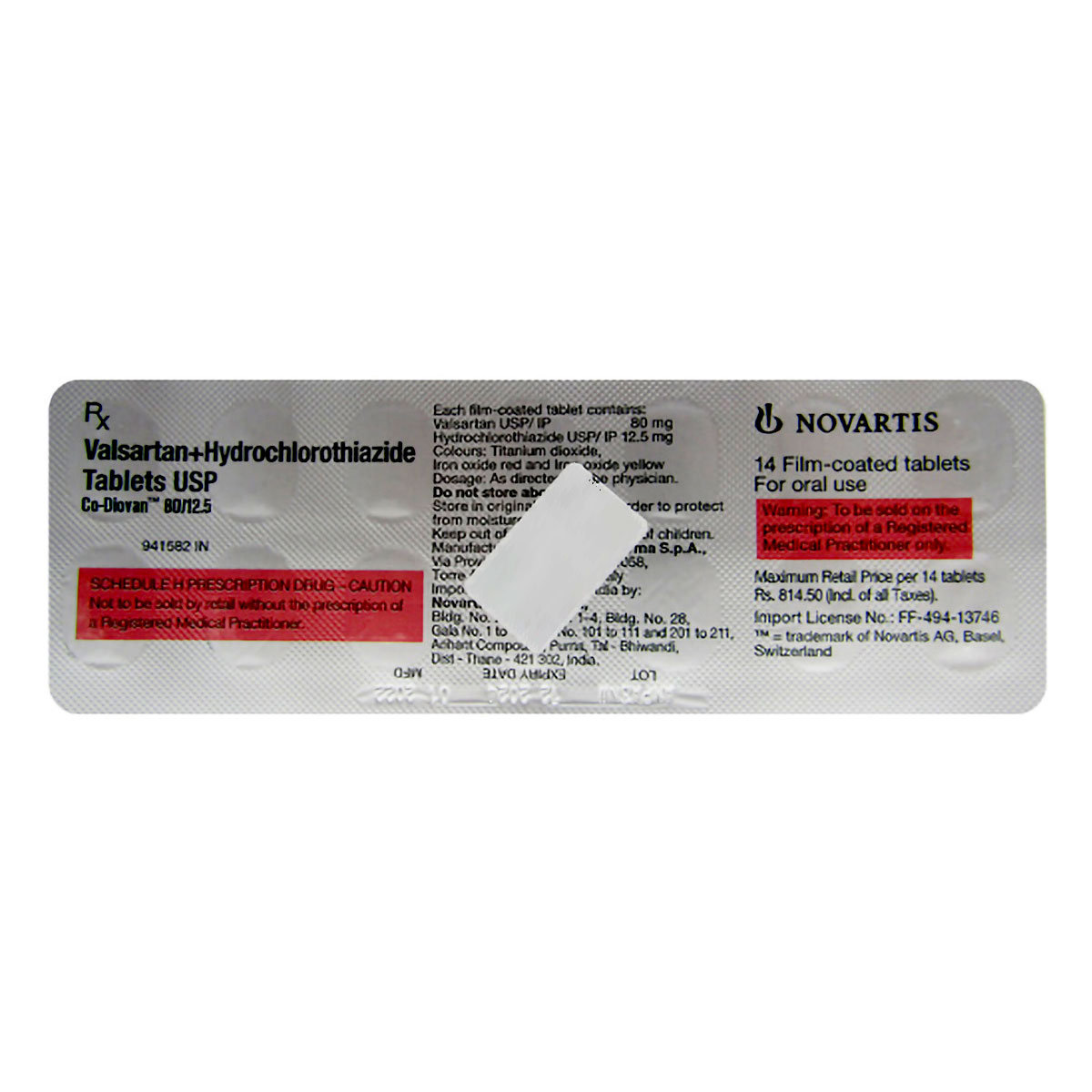Diosartan-H Tablet
MRP ₹120
(Inclusive of all Taxes)
₹18.0 Cashback (15%)
Provide Delivery Location
Online payment accepted
 Prescription drug
Prescription drugWhats That
Composition :
Consume Type :
Return Policy :
About Diosartan-H Tablet
Diosartan-H Tablet is an 'anti-hypertensives' medication primarily used for lowering high blood pressure (hypertension) by removing extra fluid (electrolytes) from the body. High blood pressure is a chronic condition in which the blood's force against the artery wall is high. As a result, it increases the risk of heart-related diseases like heart attack, heart failure, stroke, irregular heartbeat, and other complications.
Diosartan-H Tablet is a combination of two medicines namely Valsartan and hydrochlorothiazide. Valsartan is a blood pressure-lowering medicine that blocks the hormone angiotensin, thereby relaxing and widening the narrowed blood vessels. This allows the blood to flow more smoothly in the blood vessels, and the heart can pump more efficiently. On the other hand, Hydrochlorothiazide is a diuretic or water pill that works by removing extra water/fluid and certain electrolytes overload from the body. Together, Diosartan-H Tablet lowers the fluid overload, raised blood pressure, improves blood flow, and reduces the future risk of a heart attack and stroke.
Take Diosartan-H Tablet as prescribed by your doctor. You are advised to take Diosartan-H Tablet for as long as your doctor has prescribed it for you, depending on your medical conditions. You may experience nausea, diarrhea, taste change, dizziness, upset stomach, decreased blood pressure, fatigue, headache, increased blood lipid level, increased blood uric acid, electrolyte imbalance, glucose intolerance. Most of these side effects of Diosartan-H Tablet do not require medical attention and gradually resolve over time. However, if the side effects persist or worsen, please consult your doctor.
Diosartan-H Tablet should not be taken if you are known to be allergic to Diosartan-H Tablet or any other medicines. Try not to stop taking this medicine of your own. Let your doctor know about this, as it may cause a rise in blood pressure and increase heart disease and stroke risk. Do not use potassium supplements or salt substitutes unless the doctor has told you. This Diosartan-H Tablet should not be used for children as the safety and efficacy of Diosartan-H Tablet in children have not been established. You are recommended not to consume alcohol and Diosartan-H Tablet to avoid unpleasant side effects like drowsiness, dizziness, and liver damage. Drive with caution, Diosartan-H Tablet usually causes drowsiness and affects driving ability.
Uses of Diosartan-H Tablet
Directions for Use
Key Benefits
Diosartan-H Tablet is primarily used to reduce high blood pressure. It is a combination of two medicines, namely: Valsartan and Hydrochlorothiazide. Valsartan is a blood pressure-lowering medicine that blocks the hormone angiotensin, thereby relaxing and widening the narrowed blood vessels. This allows the blood to flow more smoothly in the blood vessels, and the heart can pump more efficiently. On the other hand, Hydrochlorothiazide is a diuretic or water pill that works by removing extra water/fluid and certain electrolytes overload from the body. Together, Diosartan-H Tablet lowers the fluid overload, raised blood pressure, improves blood flow, and reduces the future risk of a heart attack and stroke.
Storage
- Hydrate your body: Drink enough water to prevent dehydration and headaches.
- Calm Your Mind: Deep breathing and meditation can help you relax and relieve stress.
- Rest and Recharge: Sleep for 7-8 hours to reduce headache triggers.
- Take rest: lie down in a quiet, dark environment.
- Cold or warm compresses can help reduce tension.
- Stay Upright: Maintain good posture to keep symptoms from getting worse.
- To treat headaches naturally, try acupuncture or massage therapy.
- Over-the-counter pain relievers include acetaminophen and ibuprofen.
- Prescription Assistance: Speak with your doctor about more substantial drug alternatives.
- Severe Headaches: Seek emergency medical assistance for sudden, severe headaches.
- Frequent Headaches: If you get reoccurring headaches, consult your doctor.
- Headaches with Symptoms: Seek medical attention if your headaches include fever, disorientation, or weakness.
- Inform your doctor about dizziness symptoms. They may adjust your medication regimen or prescribe additional medications to manage symptoms.
- Follow your doctor's instructions for taking medication, and take it at the same time every day to minimize dizziness.
- When standing up, do so slowly and carefully to avoid sudden dizziness.
- Avoid making sudden movements, such as turning or bending quickly, which can exacerbate dizziness.
- Drink plenty of water throughout the day to stay hydrated and help alleviate dizziness symptoms.
- If you're feeling dizzy, sit or lie down and rest until the dizziness passes.
- Track when dizziness occurs and any factors that may trigger it, and share this information with your doctor to help manage symptoms.
- Tell your doctor about the cough symptoms you're experiencing, which may be triggered by your medication.
- Your doctor may adjust your treatment plan by changing your medication, adding new medications, or providing guidance on managing your cough symptoms.
- Practice good hygiene, including frequent handwashing, avoiding close contact with others, and avoiding sharing utensils or personal items.
- Stay hydrated by drinking plenty of fluids, such as water, tea, or soup, to help thin out mucus and soothe your throat.
- Get plenty of rest and engage in stress-reducing activities to help your body recover. If your cough persists or worsens, consult your doctor for further guidance.
- Talk to your doctor about your back pain and potential medication substitutes or dose changes.
- Try yoga or Pilates and other mild stretching exercises to increase flexibility and strengthen your back muscles.
- To lessen the tension on your back, sit and stand upright and maintain proper posture.
- To alleviate discomfort and minimize inflammation, apply heat or cold packs to the afflicted area.
- Under your doctor's supervision, think about taking over-the-counter painkillers like acetaminophen or ibuprofen.
- Make ergonomic adjustments to your workspace and daily activities to reduce strain on your back.
- To handle tension that could make back pain worse, try stress-reduction methods like deep breathing or meditation.
- Use pillows and a supportive mattress to keep your spine in the right posture as you sleep.
- Back discomfort can worsen by bending, twisting, and heavy lifting.
- Speak with a physical therapist to create a customized training regimen to increase back strength and flexibility.
- Muscle cramps can be treated with regular exercise or yoga, which includes mild stretching, which helps strengthen the lower body.
- Warm baths and gentle massage of the affected parts can help relieve cramps.
- Avoid strenuous activity and take frequent breaks, as rest is critical.
- Intake of nutritious food can help strengthen body and mind. A trained nutritionist can help design a balanced diet for strengthening muscles.
- Speak to your doctor if the pain lasts an extended period. Medical help can be practical in finding a cure for cramps.
- Report to Your Doctor: Inform your doctor about the muscle pain, as they may need to adjust your medication.
- Stretch Regularly: Gentle stretching can help relieve muscle pain and stiffness.
- Stay Hydrated: Adequate water intake supports muscle health by removing harmful substances and maintaining proper muscle function.
- Warm or Cold Compresses: Apply cold or warm compresses to the affected area to reduce pain and inflammation.
- Rest and Relaxation: Adequate rest helps alleviate muscle strain, while relaxation techniques like deep breathing and meditation can soothe muscle tightness, calm the mind, and promote relief from discomfort.
- Gentle Exercise: Participate in low-impact activities, such as yoga or short walks, to improve flexibility, reduce muscle tension, and alleviate discomfort.
- Consult a physician: If your symptoms don't improve or get worse, go to the doctor for help and guidance.
- Talk to your doctor about medicines to manage neutropenia based on the underlying cause.
- Avoid contact with people who are sick.
- Wash your hands regularly with soap and water.
- Avoid unpasteurized dairy products.
Drug Warnings
Before taking Diosartan-H Tablet inform your doctor if you have liver disease, kidney disease, gout (inflammation and pain in joints), loss of water and minerals from the body, and skin cancer. If you have diarrhea, vomiting or sweating, immediately inform your doctor as it may cause serious loss of body water and risk of lightheadedness (feeling of dizziness and faintness). Diosartan-H Tablet may affect the blood sugar, inform your doctor if you have diabetes and regularly monitor your blood sugar level. This Diosartan-H Tablet may increase skin cancer risk, thus avoiding going in the sun and using sunscreen, and wearing protective cloth when you are going out. Do not use potassium supplements or salt substitutes unless the doctor has told you. This Diosartan-H Tablet should not be used for children as the safety and efficacy of Diosartan-H Tablet in children have not been established. You are recommended not to consume alcohol and Diosartan-H Tablet to avoid unpleasant side effects like drowsiness, dizziness, and liver damage. Drive with caution, Diosartan-H Tablet usually causes drowsiness and affects driving ability.
Drug-Drug Interactions
Drug-Drug Interactions
Login/Sign Up
Using Aliskiren together with Diosartan-H Tablet may increase the risk of serious side effects (kidney problems, low blood pressure, or high potassium levels).
How to manage the interaction:
Taking Diosartan-H Tablet with Aliskiren is not advised as it can result in an interaction, it can be taken if a doctor has advised it. You should seek medical attention if you experience nausea, vomiting, weakness, confusion, tingling of the hands and feet, feelings of heaviness in the legs, a weak pulse, or a slow or irregular heartbeat. Do not discontinue any medications without a doctor's advice.
Taking Dofetilide and Diosartan-H Tablet can increase the risk of an irregular heart rhythm which can be severe. The risk increases in patients with a history of heart illness or electrolyte imbalance.
How to manage the interaction:
Combining Dofetilide and Diosartan-H Tablet together is not recommended as it can possibly result in an interaction, it can be taken if advised by your doctor. However, if you experience any symptoms like sudden dizziness, lightheadedness, fainting, shortness of breath, chest pain or tightness, rapid heartbeat, or memory loss, contact your doctor immediately. Do not discontinue any medications without consulting a doctor.
Taking Cisapride and Diosartan-H Tablet can increase the risk of an irregular heart rhythm which can be severe. The risk increases in patients with a history of heart illness or electrolyte imbalance.
How to manage the interaction:
Combining Cisapride and Diosartan-H Tablet together is generally avoided as it can possibly result in an interaction, it can be taken if advised by your doctor. However, if you experience any symptoms like dizziness, lightheadedness, fainting, or fast or pounding heartbeats, consult the doctor immediately. Do not stop using any medications without a doctor's advice.
Coadministration of Tizanidine and Diosartan-H Tablet may increase the risk of low blood pressure.
How to manage the interaction:
Although taking Tizanidine together with Diosartan-H Tablet may result in an interaction, they can be taken together if prescribed by a doctor. However, contact a doctor immediately if you experience headache, dizziness, lightheadedness, fainting, and/or changes in pulse or heart rate, contact a doctor. Do not discontinue any medication without consulting a doctor.
Co-administration of Potassium chloride with Diosartan-H Tablet may increase the risk of side effects (low blood pressure, kidney function impairment, and hyperkalemia (high blood potassium).
How to manage the interaction:
Although taking Potassium chloride together with Diosartan-H Tablet may result in an interaction, they can be taken together if prescribed by a doctor. However, consult the doctor if you experience nausea, vomiting, weakness, disorientation, tingling in your hands and feet, feelings of heaviness in your legs, or irregular heartbeat. Do not discontinue any medications without a doctor's advice.
Coadministration of Potassium acetate with Diosartan-H Tablet may increase the risk of side effects (low blood pressure, kidney function impairment, and hyperkalemia (high blood potassium).
How to manage the interaction:
Although taking Potassium acetate together with Diosartan-H Tablet may result in an interaction, they can be taken together if prescribed by a doctor. However, contact a doctor immediately if you experience nausea, vomiting, weakness, confusion, tingling of the hands and feet, feelings of heaviness in the legs, a weak pulse, or a slow or irregular heartbeat, contact a doctor. Do not discontinue any medication without consulting a doctor.
Coadministration of Fosinopril and Diosartan-H Tablet can increase the risk or severity of side effects (kidney problems, low blood pressure or high potassium levels in the body).
How to manage the interaction:
Although taking Fosinopril together with Diosartan-H Tablet may result in an interaction, they can be taken together if prescribed by a doctor. However, contact a doctor immediately if you experience symptoms such as nausea, vomiting, confusion, numbness, tingling in hands and feet, and irregular heartbeat, contact a doctor. Do not discontinue any medication without consulting a doctor.
Coadministration of Moexipril together with Diosartan-H Tablet may increase the risk of side effects (blood pressure, kidney function impairment, and hyperkalemia (high blood potassium).
How to manage the interaction:
Although taking Moexipril together with Diosartan-H Tablet may result in an interaction, they can be taken together if prescribed by a doctor. However, contact a doctor immediately if you experience symptoms such as nausea, vomiting, confusion, numbness, tingling in hands and feet, and irregular heartbeat, contact a doctor. Do not discontinue any medication without consulting a doctor.
The use of Quinapril and Diosartan-H Tablet may increase the risk of side effects (low blood pressure, kidney function impairment, and hyperkalemia (high blood potassium).
How to manage the interaction:
Although taking Quinapril together with Diosartan-H Tablet may result in an interaction, they can be taken together if prescribed by a doctor. However, contact a doctor immediately if you experience signs and symptoms of hyperkalemia, such as nausea, vomiting, confusion, numbness, tingling in hands and feet, and irregular heartbeat, contact a doctor. Do not discontinue any medication without consulting a doctor.
Coadministration of Lithium and Diosartan-H Tablet increase the blood levels of lithium.
How to manage the interaction:
Although taking Lithium together with Diosartan-H Tablet may result in an interaction, they can be taken together if prescribed by a doctor. However, contact a doctor immediately if you experience drowsiness, dizziness, confusion, loose stools, vomiting, muscle weakness, muscle incoordination, shaking of hands and legs, blurred vision, ringing in the ear, excessive thirst, and/or increased urination, contact a doctor. Do not discontinue any medication without consulting a doctor.
Drug-Food Interactions
Drug-Food Interactions
Login/Sign Up
Lentils, Orange Juice, Oranges, Raisins, Potatoes, Salmon Dried, Spinach, Sweet Potatoes, Tomatoes, Coconut Water, Beans, Beetroot, Broccoli, Bananas, Apricots, Avocado, Yogurt
How to manage the interaction:
Consumption of Diosartan-H Tablet with potassium-containing salt substitutes may increase the potassium levels in the body. Avoid potassium-containing salt substitutes while being treated with Diosartan-H Tablet.
Diet & Lifestyle Advise
- Keep your weight under control with BMI of 19.5-24.9.
- Do regular physical activity or exercise for at least 150 minutes per week, or about 30 minutes most days of the week. Doing this can help you to lower your raised blood pressure by about 5 mm of Hg.
- Limit intake of sodium chloride (table salt) in your daily diet to 2300 mg per day or less than 1500 mg is ideal for most adults.
- If you are taking alcohol, then only one serving for women and two servings for men is advisable.
- Quitting smoking is the best strategy to lower the risk of heart disease.
- Avoid chronic stress as it can raise your blood pressure. Try to enjoy and spent time with your loved ones to cope with stress and practice mindfulness techniques.
- Monitor your blood pressure daily and if there is too much fluctuation, then immediately contact your doctor.
- Try to include heart-healthy omega 3 fatty acids-containing food drinks in your daily diet. You can also use low-fat cooking oil like olive oil, soybean oil, canola oil, and coconut oil to lower your elevated blood pressure.
Side Effects of Diosartan-H Tablet
- Nausea
- Diarrhea
- Taste change
- Dizziness
- Upset stomach
- Decreased blood pressure
- Fatigue
- Headache
- Increased blood lipid level
- Increased blood uric acid
- Electrolyte imbalance
- Glucose intolerance.
Habit Forming
Therapeutic Class
All Substitutes & Brand Comparisons
RX
Out of StockValsazem 80 H Tablet
Zeelab Pharmacy Pvt Ltd
₹70
(₹6.3 per unit)
41% CHEAPERRX
Out of StockValfect H 80 Tablet 10's
Astra Zeneca Pharma India Ltd
₹104
(₹9.36 per unit)
13% CHEAPERRX
Out of StockValent-H Tablet
Lupin Ltd
₹168.9
(₹15.2 per unit)
40% COSTLIER
Drug-Diseases Interactions
Drug-Diseases Interactions
Login/Sign Up
FAQs
Diosartan-H Tablet is a combination of two medicines, namely: Valsartan and Hydrochlorothiazide. Valsartan is an angiotensin receptor blocker (ARB) that blocks the hormone angiotensin and relaxes blood vessels. This allows the blood to flow more smoothly in the blood vessels, and the heart can pump more efficiently. Hydrochlorothiazide (diuretic or water pill) removes extra water and certain electrolytes from the body. Together, both lower fluid overload, blood pressure improves blood flow and reduce the future risk of a heart attack.
Yes, Diosartan-H Tablet can cause dizziness. It is advised to avoid driving or operate any heavy machinery while taking Diosartan-H Tablet. In case you feel dizzy or lightheaded, it is advised to rest for some time until you feel better.
In case you have missed a dose of Diosartan-H Tablet, you are advised to take it as soon as you remember. However, try not to miss a dose in the first place, if it's time for you to take your next dose, then do not take both doses together. Take only one dose; taking a double dose of Diosartan-H Tablet will lead to low blood pressure.
No, you are advised to inform your doctor and monitor your blood pressure for at least two weeks before stopping the medicine. Depending upon your current blood pressure readings, there is a possibility your doctor may lower your medicine dosage and not recommend discontinuing it.
Do not use Diosartan-H Tablet if you are pregnant, planning for pregnancy, or unable to urinate. If you have diabetes and taking Diosartan-H Tablet with other blood pressure-lowering pills like 'aliskiren,' immediately stop taking both together and consult a doctor.
No, Diosartan-H Tablet does not lead to weight gain as a side effect. However, if your kidney function worsens, your body may swell due to water build-up (fluid retention), causing weight gain. Advise your doctor if you feel any unexplained weight gain or swelling in your ankles, feet, or hands.
Drug-Drug Interactions Checker List
- LITHIUM
- METFORMIN
- INSULIN
- ATENOLOL
- ALISKIREN
- CAPTOPRIL
- ENALAPRIL
- LISINOPRIL
- RAMIPRIL
- METOPROLOL
- IBUPROFEN
- CODEINE
- DEXAMETHASONE
Special Advise
- Do not use Diosartan-H Tablet if you are pregnant, planning for pregnancy, or unable to urinate.
- If you have diabetes and taking Diosartan-H Tablet with other blood pressure-lowering pills like 'aliskiren,' immediately stop taking both together and consult a doctor, as it may cause serious complications.
- Do not use potassium supplements or salt substitutes while using Diosartan-H Tablet unless your doctor has told you to do so.
Disease/Condition Glossary
Hypertension: It is a chronic condition when blood pressure is too high. This condition can lead to hardened arteries (blood vessels), decreasing the blood and oxygen flow to the heart. Blood pressure is the measurement of the force that our heart uses to pump blood to all parts of the body. Raised blood pressure can cause chest pain (angina) and heart attack (when blood supply to the heart is blocked). Additionally, high blood pressure also causes brain damage (stroke) and kidney failure. High blood pressure can be diagnosed with the help of a blood pressure monitor or sphygmomanometer. Systolic pressure is the pressure when the heart pumps blood out. On the other hand, diastolic pressure is when your heart is at the resting stage between heartbeats. If your blood pressure is 140/90 mm of Hg, it means the systolic pressure is 140 mm of Hg, and diastolic pressure is 90 mm of Hg. Ideal blood pressure should be between 90/60 mm of Hg and 120/80 mm of Hg.

Have a query?
Alcohol
Safe if prescribed
You are recommended not to consume alcohol and Diosartan-H Tablet to avoid unpleasant side effects like drowsiness, dizziness, and liver damage.
Pregnancy
Consult your doctor
Diosartan-H Tablet is not recommended during pregnancy. This medicine may cause fetal damage and can cause serious harm to the unborn baby (fetus).
Breast Feeding
Consult your doctor
Diosartan-H Tablet is known to pass breast milk, but its effect on the baby is not known. So, before breastfeeding, let your doctor know about this.
Driving
Safe if prescribed
Drive with caution, Diosartan-H Tablet usually causes drowsiness and affects driving ability.
Liver
Consult your doctor
Diosartan-H Tablet to be taken with caution, especially if you have had a history of liver disease. Your doctor will have to change the dosage depending on your medical condition and your reaction to treatment.
Kidney
Consult your doctor
Diosartan-H Tablet to be taken with caution, especially if you have had a history of kidney disease. Your doctor will have to change the dosage depending on your medical condition and your reaction to treatment.
Children
Safe if prescribed
Diosartan-H Tablet should not be used for children as the safety and efficacy of Diosartan-H Tablet in children have not established.










